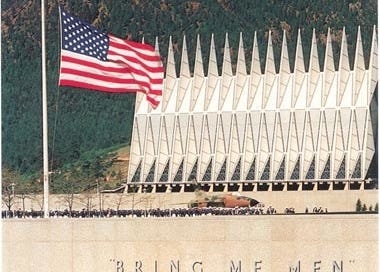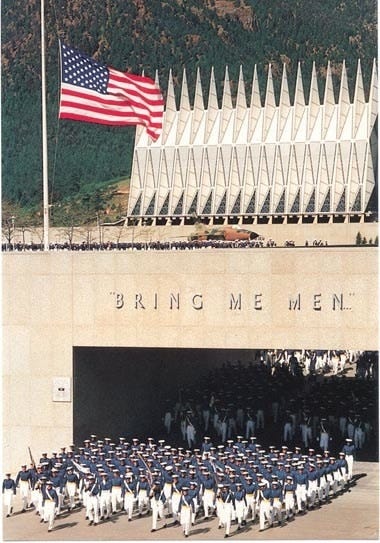This article is a response to Uncle John’s recent article,
He writes in relation to the Ivies and provides some good insight. I considered the U.S. Service Academies as equal in distinction, but different. At least they had clear goals, unlike the devolution that crept into the mainstream Ivy Leagues.
Americans like to believe we live in an egalitarian system of pure meritocracy. I and others argue that we don’t. Sure, some will attain to the higher reaches of society through moxie and guile, but not without at least one thread that connects someone from the upper class to that promising individual of the lower class. I was definitely from the Working class. The adopted son of a state government worker and a divorced mother, I attained a scholarship to the United States Air Force Academy in 1987. At the time, it was in the top three of most selective colleges in the entire country, the Ivies included. This was due in no small part to the movie Top Gun being released the year before. Now everyone thought they wanted to be a fighter pilot. Years of my own preparation, beginning at age 12, almost went down the drain. Fortunately, I still gained admission.
[A quick aside. A Service Academy scholarship comes with full room and board, all expenses paid, books, even a montly stipend. The only catch is you owe at least five years of military service upon graduation. I thought it was the best scholarship to get at the time and didn’t even apply to any of the Ivies.]
It was definitely a melting pot of the Classes. I was rubbing shoulders with sons of Senators and Generals. Legacies whose dads were astronauts. My own classmate became a test pilot and flew the Space Shuttle. At the same time, my roommates were a son of a farmer from Kentucky and another a son of a single mother from West Virginia. The academics were rigorous. Over 163 hours in 4 years, that doesn’t include summer mandatory hours. That averages to over 20 hours per semester. The point is that I came out of there thinking I’d accomplished something real, that it would matter later in life. Maybe it did for some, but it never really did for me. While I’ll grant I might not have had all the talent I thought I did, I also think the dismissive attitudes had to to with this Class structure the linked article is talking about.
I will never forget sitting next a student from Colorado College on a plane back home for break my Senior year. We struck up a conversation. Students at the Academy generally regarded those at Colorado College with disdain. We thought they had little to offer humanity other than system-challenging ideas. Supporting the status quo was my highest ideal at the time. I was taught that and nothing else. When we started discussing politics, I found myself completely disarmed and unable to mount even a feeble defense of why I supported the system. At the time, I was intellectually unprepared to counter even the most specious of Marxist arguments. Instead, I was dumb-founded. I was wondering how he could come by the knowledge he had while I had never even heard of the authors he was referencing.
I was being equipped to defend it, and I didn’t even know why.
In the years since, the blinders have slowly come off and I’ve often thought about that encounter on the plane. I understand now that I was being trained according to my class and station. I showed enough promise to enter the Management class. I was under no circumstances to even be introduced to the Ruling class of government officials, artists, and thought leaders. I was being taught to follow orders, not question them. My class rank was to be enmeshed in the military/corporate system through work, debt, and education. My peer at Colorado College was obviously learning something very different. He may not have been groomed to enter the Ruling class, but he was certainly being equipped to challenge it whereas I was being equipped to defend it, and I didn’t even know why.
I was given a spiritual heritage for which I am grateful. Beyond that, I was left to my own path with little direction. Why? Because my family was in a different class than a Mitt Romney or a Chris Hedges or a Mark Zuckerberg or a Bill Gates. (As a telling rubric, ask yourself who among your friends has a child named Mitt or Newt or Tip?) I was able to get my “education” knocked out. But I now know that it was more indoctrination than education. The alternative was to remain in the Working class, from which I was plucked.
What is my answer? This is where Local Vision and Engagement circle back around:
Withdrawl of consent. How? Education and interdependent local communities.
Education is the answer, but not within the current system. The current system sorts people by class largely based on familial birth. And that system isn’t going to change. What I’m offering is a hope that in local communities, we can still thrive without the tentacles of a governmental class meddling as much as they have since WW2.
Those from “establishment” families are going to the Ivy League, period. It doesn’t matter that there are hundreds of thousands of intellectually brighter students out there. The meritocracy limits who and how many can move up in class. Instead, I argue that with the advent of the Internet, we now have the tools to effect a real education of many millions of people. The opportunities for autodidactic education are limited only by the time the individual has to pursue them. A loaded statement to be sure, because who will have the time unless you’re free from the incessant work required to live in the working classes? Some of that freedom can come from working together instead of the Atomization of social life that was force fed us through propaganda and greed.
Education will eventually lead to the withdrawal of consent to our current paradigms. When enough people truly withdraw their consent, we will have change, at least locally. The best way for us to withdraw that consent lies in financial interdependence to lessen our dependence on their systems. When people are interdependent locally, they are more able to speak and live free of the Leviathan we are currently under.
So what to do next? First, stop supporting those that hate you. Your dollars are votes. Build your own platforms. Invest in local communities. Support local businesses and help them build quality.






This is an interesting take. It makes total sense to anyone from the Non-Urban Continuum, but different enough from my experience to be complementary. Another point of view on the time.
Class is important and complex. Fractal, where every slice subdivides hierarchically. One thing the working class was less attuned to was the “aspirational” upper middle class. The ones obsessed with establishment class trappings but with no understanding of what establishment class socio-culture was. Get a Beemer. Get the kid into Ivy world. The implication being it’s an entry. It really isn’t. The elites were presegregated. It’s not who gets the diploma, it’s the special invitation only clubs and societies. Social networking outside school in inaccessible venues. That has no interest in a willful hedonistic outlier floating along on test scores and RAM. But I could see it. And see that it wasn’t for me.
There are - or were - class exceptions that were an important part of smooth beast system operations. I suspect that’s gone now. The elite used it to sift for useful talent. Potential ticket takers. There was a Wall St./ Big Law path into the room. Senior partners and global banksters came through an insanely ruthless selection system. Everyone wanted to be Gecko, but 98% were gone in 3 years. Others could show the right gifts and personality. But most just high-functioning NPCed their way down the available clear paths to middle class comfort. Because there was a brief window where a “meritocratic” [by system rules] path coexisted with finishing school for the elite. That’s probably gone too.
"I was intellectually unprepared to counter even the most specious of Marxist arguments. Instead, I was dumb-founded. I was wondering how he could come by the knowledge he had while I had never even heard of the authors he was referencing."
"I understand now that I was being trained according to my class and station."
This strikes an echo, in hindsight. The only real challenging ideas I was exposed to was my radically Marxist friend in secondary school. He could out-argue any one of us, though we were all his intellectual equals.